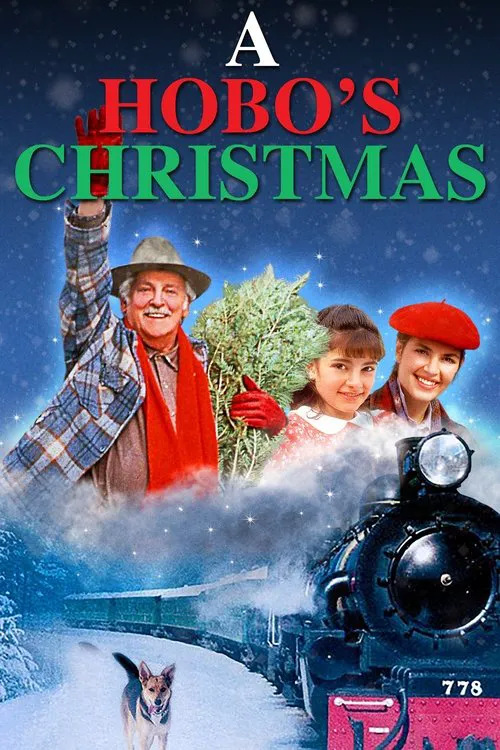A Hobo's Christmas

Plot
In the gentle, yet poignant portrayal of "A Hobo's Christmas," the struggles of redemption and forgiveness are skillfully woven into a heartwarming tale of a father's quest to rekindle lost bonds. At its core, this uplifting holiday film is a story about the complexities of love, family, and the complexities of human relationships. The poignant narrative explores the delicate balance between the past and the present, as well as the transformative power of love and sacrifice. The year is 1920-somewhat after, but the story unfolds in Salt Lake City during the festive season of Christmas. A grizzled, weathered hobo, played by the inimitable Barnard Hughes, has traversed the vast expanse of America, driven by an insatiable wanderlust and an unrelenting desire to rediscover his roots. With a heart worn down by the unforgiving trials of a life lived on the fringes of society, the old hobo, with his threadbare tunic and tattered hat, is a man on the brink of surrender. His odyssey brings him to the doorstep of his hometown, Salt Lake City, a place he had long thought was forever lost to him. As he wanders the familiar streets, a mix of nostalgia and melancholy washes over him, stirring long-dormant memories and emotions. The old hobo knows that his return will not be without its challenges, for it is in this very city that he abandoned his family, leaving behind a son and a daughter who were, then, barely out of childhood. The son, now a man in his prime, played with a compelling mix of warmth and reserve by Gerald McRaney, has spent a quarter-century nursing a deep-seated resentment towards the father who vanished without a word. The memories of that distant past continue to haunt him, fueling a sense of abandonment and hurt that remains unresolved. When the old hobo finally arrives at his door, his son is caught off guard, forced to confront a past he had all but forgotten. As the story unfolds, the contrast between the old hobo's nostalgia for a bygone era and his son's deep-seated hurt becomes increasingly apparent. The old hobo's yearning for the simple, idyllic life that once was is at odds with his son's determination to protect himself from a painful past. Yet, beneath the layers of anger and disappointment, a glimmer of hope remains, a spark that flickers with the promise of forgiveness and redemption. While the old hobo's son is still unwilling to open his heart to his father, the old hobo is granted a reprieve – a single day with his grandchildren, whom he has never met. The encounter is bittersweet, as the old hobo struggles to bridge the gap between himself and the children, who view him with a mixture of curiosity and suspicion. Despite the awkwardness that often accompanies reunions, the grandchildren slowly begin to warm towards their grandfather, revealing a deep affection and acceptance that transcends the pain of the past. Meanwhile, the old hobo's friends, a motley crew of fellow hobos who have known him for years, caution him about the dangers of reopening old wounds. They implore him to leave the past alone, to avoid stirring up memories that are best forgotten. Their words of wisdom are tinged with a hint of warning, a reminder that the past can be a cruel and unforgiving master. Yet, the old hobo cannot heed the advice of his friends. Drawn by an irresistible force, he is compelled to confront the past, to seek out the answers that have been hidden for so long. As he does so, he begins to realize that the wounds he believed were long healed were, in fact, still raw and tender. The encounter with his son and grandchildren forces him to confront the consequences of his actions, to acknowledge the harm he has caused and to seek forgiveness. Throughout the film, the cinematography is warm and evocative, capturing the beauty of Salt Lake City during the Christmas season. The snowy landscape, the twinkling lights, and the warmth of the firesides create a sense of coziness and comfort that underscores the themes of love and family. As the old hobo's journey reaches its poignant conclusion, he is able to find a measure of redemption, not through apologies or grand gestures, but through simple, quiet acts of love and kindness. His son begins to understand that forgiveness is not about forgetting the past, but about confronting it and making amends. And the grandchildren come to see their grandfather in a new light, as a flawed but loving figure, worthy of their affection and admiration. Ultimately, "A Hobo's Christmas" is a poignant reminder that family is not just about blood ties, but about the bonds that unite us across generations. It is a testament to the power of love and forgiveness to transcend even the most painful of wounds. As the credits roll, the viewer is left with a sense of hope and renewal, a sense that even in the darkest of times, there is always the possibility for redemption and forgiveness.
Reviews
Recommendations




